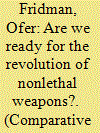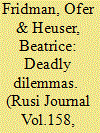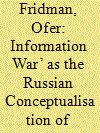| Srl | Item |
| 1 |
ID:
122296


|
|
|
|
|
| Publication |
2013.
|
| Summary/Abstract |
This article presents a comprehensive Revolution in Military Affairs (RMA) model that is built on previous RMA research. This model examines the political, strategic, and military situation, and technological developments in the beginning of the second decade of the twenty-first century, and argues that nonlethal weapons have a potential to lie at the core of the next RMA.
|
|
|
|
|
|
|
|
|
|
|
|
|
|
|
|
| 2 |
ID:
124744


|
|
|
|
|
| Publication |
2013.
|
| Summary/Abstract |
Since the second world war, counter insurgency and counter terrorism operations have become much more frequent and widespread than large scale conventional confrontation. While at first three was a widespread perception that relatively small badly trained and poorly equipped groups.
|
|
|
|
|
|
|
|
|
|
|
|
|
|
|
|
| 3 |
ID:
152643


|
|
|
|
|
| Summary/Abstract |
During the last decade, ‘hybrid warfare’ has become a much used yet controversial term in professional military and political discussions. Since the beginning of the Ukraine crisis in 2014 its Russian counterpart, gibridnaya voyna, has also become very popular in professional military and academic discourse in Russia. Ofer Fridman explores Russian conceptual and theoretical publications and political analyses, showing that the only common ground between the two terms is the name. A grasp of the essential conceptual differences is vital in understanding contemporary political-security discourses in the post-Soviet region.
|
|
|
|
|
|
|
|
|
|
|
|
|
|
|
|
| 4 |
ID:
171666


|
|
|
|
|
| Summary/Abstract |
The Kremlin employs a type of ‘strategic communications’, which, according to the Russian conceptualisation of information war, is a combination of military and non-military means intended to influence the information-psychological space of a targeted audience. Ofer Fridman argues that the Kremlin’s employment of economic counter-sanctions (non-military means) and its intervention in Syria (military means) demonstrate the Kremlin’s capability to participate in information war – the Russian counterpart of Western strategic communications.
|
|
|
|
|
|
|
|
|
|
|
|
|
|
|
|
| 5 |
ID:
150111


|
|
|
|
|
| Summary/Abstract |
The existing literature suggests different ways to explain the interconnection between technology, military, and society that creates changes in military affairs. It seems, however, that most of this literature concentrates on successful cases of military transformations and overlooks a significant number of failed transformations. The purpose of this article is to define the conceptual social-political-military environment that creates, or not, military transformations in general, and revolutions in military affairs (RMAs) in particular. Supporting its argument with two historical examples, this article suggests that an RMA is an outcome of traceable imbalance between political leadership, its military, and unmet political-military challenges. The conceptual framework proposed by the article significantly improves the ability of scholars and practitioners to explore, explain, and anticipate the possible directions of military transformations by a systematic examination of the political-military challenges that these transformations are intended to bridge and the socio-cultural environments that shape political-military decision-making processes.
|
|
|
|
|
|
|
|
|
|
|
|
|
|
|
|